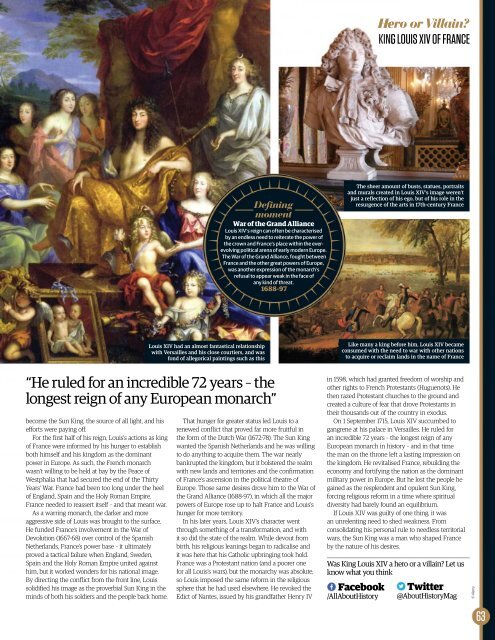All About - History - Hitler Versus Stain
All About History offers a energizing and entertaining alternative to the academic style of existing titles. The key focus of All About History is to tell the wonderful, fascinating and engrossing stories that make up the world’s history.
All About History offers a energizing and entertaining alternative to the academic style of existing titles. The key focus of All About History is to tell the wonderful, fascinating and engrossing stories that make up the world’s history.
Create successful ePaper yourself
Turn your PDF publications into a flip-book with our unique Google optimized e-Paper software.
Hero or Villain?<br />
G LOUIS XIV OF FRANCE<br />
Defining<br />
moment<br />
WaroftheGrand<strong>All</strong>iance<br />
LouisXIV’sreigncanoftenbecharacterised<br />
byanendlessneedtoreiteratethepowerof<br />
thecrownandFrance’splacewithintheeverevolving<br />
political arena of early modern Europe.<br />
The War of the Grand <strong>All</strong>iance, fought between<br />
France and the other great powers of Europe,<br />
wasanotherexpressionofthemonarch’s<br />
refusaltoappearweakinthefaceof<br />
anykindofthreat.<br />
1688-97<br />
The sheer amount of busts, statues, portraits<br />
and murals created in Louis XIV’s image weren’t<br />
just a reflection of his ego, but of his role in the<br />
resurgence of the arts in 17th-century France<br />
Louis XIV had an almost fantastical relationship<br />
with Versailles and his close courtiers, and was<br />
fond of allegorical paintings such as this<br />
Like many a king before him, Louis XIV became<br />
consumed with the need to war with other nations<br />
to acquire or reclaim lands in the name of France<br />
“He ruled for an incredible 72 years – the<br />
longest reign of any European monarch”<br />
become the Sun King, the source of all light, and his<br />
efforts were paying off.<br />
For the first half of his reign, Louis’s actions as king<br />
of France were informed by his hunger to establish<br />
both himself and his kingdom as the dominant<br />
power in Europe. As such, the French monarch<br />
wasn’t willing to be held at bay by the Peace of<br />
Westphalia that had secured the end of the Thirty<br />
Years’ War. France had been too long under the heel<br />
of England, Spain and the Holy Roman Empire.<br />
France needed to reassert itself – and that meant war.<br />
As a warring monarch, the darker and more<br />
aggressive side of Louis was brought to the surface.<br />
He funded France’s involvement in the War of<br />
Devolution (1667-68) over control of the Spanish<br />
Netherlands, France’s power base – it ultimately<br />
proved a tactical failure when England, Sweden,<br />
Spain and the Holy Roman Empire united against<br />
him, but it worked wonders for his national image.<br />
By directing the conflict from the front line, Louis<br />
solidified his image as the proverbial Sun King in the<br />
minds of both his soldiers and the people back home.<br />
That hunger for greater status led Louis to a<br />
renewed conflict that proved far more fruitful in<br />
the form of the Dutch War (1672-78). The Sun King<br />
wanted the Spanish Netherlands and he was willing<br />
to do anything to acquire them. The war nearly<br />
bankrupted the kingdom, but it bolstered the realm<br />
with new lands and territories and the confirmation<br />
of France’s ascension in the political theatre of<br />
Europe. Those same desires drove him to the War of<br />
the Grand <strong>All</strong>iance (1688-97), in which all the major<br />
powers of Europe rose up to halt France and Louis’s<br />
hunger for more territory.<br />
In his later years, Louis XIV’s character went<br />
through something of a transformation, and with<br />
it so did the state of the realm. While devout from<br />
birth, his religious leanings began to radicalise and<br />
it was here that his Catholic upbringing took hold.<br />
France was a Protestant nation (and a poorer one<br />
for all Louis’s wars), but the monarchy was absolute,<br />
so Louis imposed the same reform in the religious<br />
sphere that he had used elsewhere. He revoked the<br />
Edict of Nantes, issued by his grandfather Henry IV<br />
in 1598, which had granted freedom of worship and<br />
other rights to French Protestants (Huguenots). He<br />
then razed Protestant churches to the ground and<br />
created a culture of fear that drove Protestants in<br />
their thousands out of the country in exodus.<br />
On 1 September 1715, Louis XIV succumbed to<br />
gangrene at his palace in Versailles. He ruled for<br />
an incredible 72 years – the longest reign of any<br />
European monarch in history – and in that time<br />
the man on the throne left a lasting impression on<br />
the kingdom. He revitalised France, rebuilding the<br />
economy and fortifying the nation as the dominant<br />
military power in Europe. But he lost the people he<br />
gained as the resplendent and opulent Sun King,<br />
forcing religious reform in a time where spiritual<br />
diversity had barely found an equilibrium.<br />
If Louis XIV was guilty of one thing, it was<br />
an unrelenting need to shed weakness. From<br />
consolidating his personal rule to needless territorial<br />
wars, the Sun King was a man who shaped France<br />
by the nature of his desires.<br />
Was King Louis XIV a hero or a villain? Let us<br />
know what you think<br />
Facebook<br />
/<strong>All</strong><strong>About</strong><strong>History</strong><br />
Twitter<br />
@<strong>About</strong><strong>History</strong>Mag<br />
© Alamy<br />
63


















